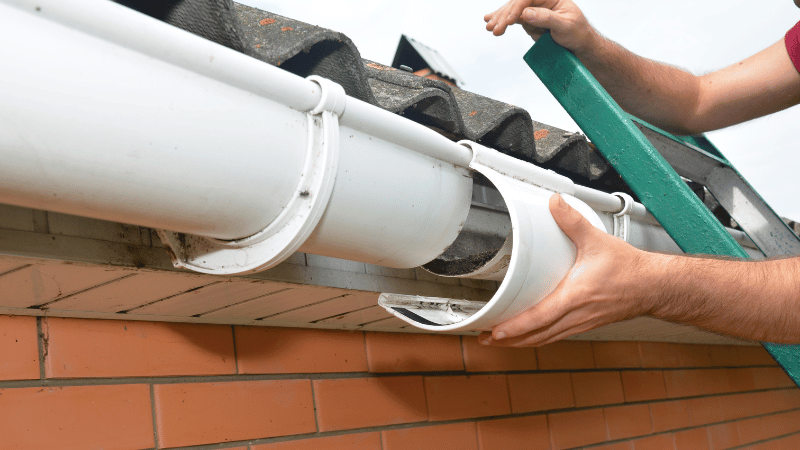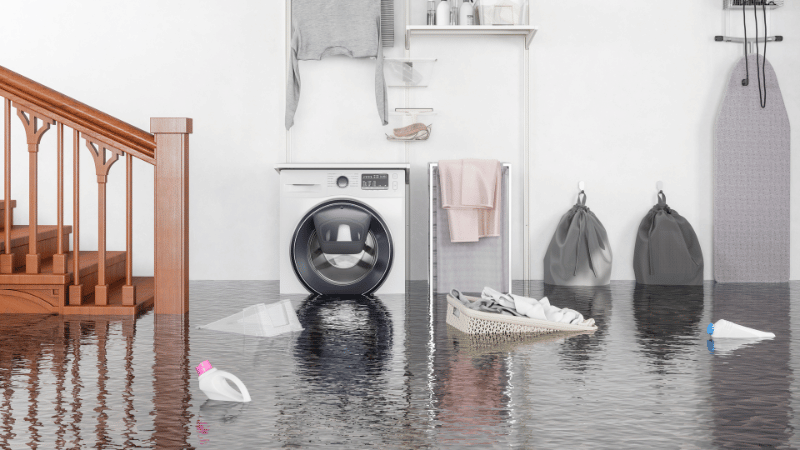Basement flooding is a nightmare. Imagine, it is raining outside, and you start noticing water coming into your basement. Going through this same problem again and again is frustrating as you will need to deal with water damage every time it rains. But sometimes, flood damage in the basement can occur due to other reasons such as:
- Plumbing Leaks: When pipes become worn out or frozen, there is a higher chance that they could burst which could spill water into your basement.
- Faulty Appliances: Your basement can become damaged if appliances like the washing machine or water heater break and spill water.
- Leaky Basement Foundation: This is one of the most common reasons why your basement floods when it rains. Whenever there is rain or accumulation of water around the foundation of your house, the water can easily seep into basement through cracks, holes in the walls, or because of poor yard drainage. Sometimes if your downspout is too close to your property, it can increase the chances of water building up around the foundation.
- Interior condensation: When it gets too humid in the basement, there is a chance condensation can form and make the area wet and musty.
Table of Contents
What to do if your basement floods?
If your basement is routinely vulnerable to water leaks or floods, there are some steps that you can take to limit the damage. However, we recommend you call our water damage restoration and repair specialists for dealing with flood damage cleanup.
- Remove Water: This is the first necessary action you need to take to remove and drain out the water as quickly as possible. If the water is not quickly removed, it can destroy your belongings and result in major property damage.
- Keep the Moisture under Control: After taking out the standing water, there will still be moisture in the basement. It is recommended to use fans and dehumidifiers to eliminate this moisture which can prevent mold from occurring. The appearance of mold growth will only make the damage worse.
- Clean the Damage: If some of your belongings have been damaged such as carpets, furniture or even walls, it is ideal to replace or restore them.
It is important to flood proof your basement to eliminate any dangers of water damage and mold growth. Below are some tips and recommendations on how you can make your basement waterproof.
Does Homeowner’s Insurance Cover Damage from Floods?
It is common for people to wonder if their homeowner’s insurance will cover damage from flooding. The answer is no. Outside floods and earthquakes are extremely costly to handle, thus they are not included in the standard homeowner’s insurance policy. You may need to purchase a separate flood insurance policy and see if any coverages are available for that. That’s why we highly recommend you to flood-proof your basement rather than spend money on insurance.
Homeowner’s insurance does cover flood damage from an internal source like a pipe burst or overflow if the cause is determined to be sudden and accidental. Your insurance will not cover water and flood damage caused by neglect.

8 Effective Ways to Try To Prevent Your Basement from Flooding
1. Install a Sump Pump:
Sump pumps are effective for keeping your basement dry and free from water damage, mold, and mildew. A sump pump will automatically take the water away from your house and will keep your crawl space and basement dry.
2. Install a Window Well Cover:
If your basement has below grade windows, we recommend you install a window well cover. These covers can protect your basement from excessive water, floods, and debris. As an added bonus, they also keep pests and flies from entering the property.
3. Install Backwater Valve:
Installing a backwater valve can protect your basement or house in general from any unwanted floods or water. Having a backwater valve and sump pump is an investment that you need to take in order to save yourselves from any kind of damage repairs and restoration. A backwater valve automatically senses when there is a reverse flow from the sewage and protects the basement from getting affected by floods. Usually, the life expectancy for this machine is around 7 to 10 years.
4. Add Extensions to your Gutters:
Adding downspout extensions can encourage water to flow away from your home’s foundation. If you notice any water pooling near the downspout, it is a clear indication to have an extension attached to drain the water at least 4 to 5 feet away from your foundation.
5. Keep Your Gutters and Downspouts Clean:
When your gutters and downspouts are clean, there is less of a chance of them getting clogged. Water cannot flow down if there is an accumulation of debris within. Hence, it is best to clean your gutters and downspouts at least two times a year in order to prevent any flooding.
6. Install a French Drain:
A French Drain is a good and cost-effective idea to prevent flooding or standing water entering your basement. The drain pulls in the water from the nearest soil and redirects it to the nearest biggest drainage location.
7. Seal the Cracks and Holes:
Use a caulking gun and epoxy-based resin to seal any visible holes on your basement walls and ceiling. However sometimes, there are hidden cracks which can be the real cause of the water leaks. For that, you can apply a sealant all the entire wall in order to be safe from flooding.
8. Adjust your Landscaping:
The landscape around your foundation should slope away from your home so that water can drain a safe distance from the home. If your landscaping does not slope away from the foundation, you should adjust the grading of your landscape so that it does and allows water to drain far enough away.
Call ServiceMaster by Replacements for Flood Damage Cleanup
If you have food damage in your basement or are experiencing leaks, please do not hesitate to call ServiceMaster by Replacements for flood damage cleanup. Our professionals have the equipment to address water damage or basement flooding and dry and restore the affected areas.
For all of your disaster restoration needs, contact us at (732) 842-6917 or fill out a form on our website.







